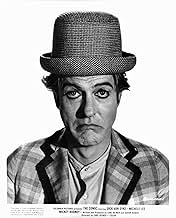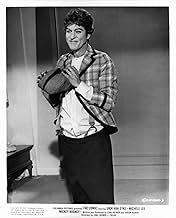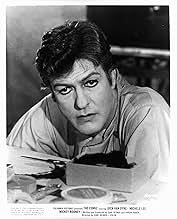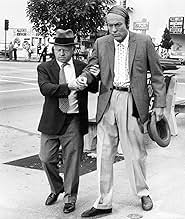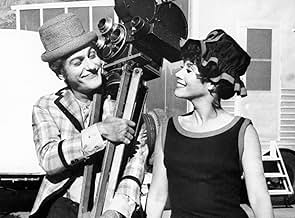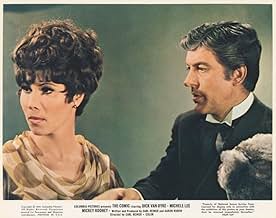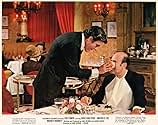IMDb-BEWERTUNG
6,4/10
1060
IHRE BEWERTUNG
Füge eine Handlung in deiner Sprache hinzuStory of a brilliant silent-film comic whose talent is overshadowed by his ego.Story of a brilliant silent-film comic whose talent is overshadowed by his ego.Story of a brilliant silent-film comic whose talent is overshadowed by his ego.
Gavin MacLeod
- 1st Director
- (as Gavin Mac Leod)
Isabel Sanford
- Woman in Detergent Commercial
- (as Isabell Sanford)
Empfohlene Bewertungen
Carl Reiner's 1969 film, "The Comic," like Elia Kazan's 1957 movie, "A Face in the Crowd," is a cautionary tale about fame and Hollywood. Both deserved more attention, and truth to tell, some awards (or at least some nominations), and gained notoriety years after their release as fans and film aficionados discovered the works amid new appreciation for earlier eras. "The Comic" is arguably one of the most overlooked films of the inside-Hollywood genre, probably because it came along in a period when the film industry was convulsing into a grittier, more realistic phase (indeed a year when John Wayne in "True Grit" competed against both stars of the X-rated "Midnight Cowboy," with Wayne winning best actor and "Cowboy" winning best picture _ talk about a mixed cinematic metaphor). In "The Comic," a roman a clef which was written, produced and directed by Carl Reiner, Dick Van Dyke plays the fictitious silent film star Billy Bright (the film's initial title was the name) _ a character that in itself has caused some debate as to who it was really based on, with many saying it's a composite of Harry Langdon, Buster Keaton and Stan Laurel, the latter Van Dyke's hero and friend. Others also have seen shades of Harold Lloyd. Having interviewed Van Dyke some years later when he spoke fondly of Laurel and how they met, describing how he delivered the eulogy at Laurel's funeral, and how anxious he was to discover the whereabouts of the comedian's famed bowler hat that he said he had been promised but never received (I was pretty sure I knew the guy who had it and shared the information), I find it difficult to believe he would have based the character on someone about whom he cared so deeply. At any rate, as a denizen of Hollywood and a fan of the silents who grew up at a time when many of the old comics were still around and re-emerging, I can say without hesitation that Van Dyke got it right and hit a home run in what is perhaps the best work of his career (Van Dyke doesn't get enough credit for the fine work he did in films, largely because he came along at a time when the division between TV and film was great and the film people still looked down upon their TV counterparts, and again, film was in the midst of a great transition). Reiner (known to later generations as Rob Reiner's Dad, but to many of us as the brilliant second banana on Sid Caesar's early-TV "Show of Shows" and one half of the 2000-year-old man comedy team with his friend Mel Brooks) constructs the film beautifully from the opening sequence at Billy's funeral. The latter, an absolute hoot, contains an overhead shot of cars driving on the way to the burial plot that will have you struggling to keep a straight face at every funeral you attend from here on out, and while that isn't a humorous thing, it demonstrates the power and the rightness of the moment. One of the more fascinating elements of the film is a Hollywood story-within-a-story, how Carl Reiner's pacing and sense of comedic irony laced with sadness and the sense of smiling through the tears influenced his own son Rob's acting and directing style. Now there's a subject for a future film. "The Comic" is a keeper and deserves to be seen and more widely discussed, if only to shed more attention on the silent era lest it be forgotten in a time of pyrotechnic overkill.
This film was obviously made to use the comic talents of Dick Van Dyke and they did. He was always pulling faces and doing pratfalls on stage and TV and has always had a strikingly strong resemblance to a young Stan Laurel. It had been said in early magazines that Van Dyke felt he was born in the wrong era. With this film he gets to fulfill his dream. Even the dialog scenes play and read like a silent movie and the comedy timing is priceless, especially in scenes with Mickey Rooney who did the eye tricks with no computer help. Michelle Lee is there, for her looks mostly, plus a lot of great cameo comedy bits by the likes of Pert Kelton, Jeannine Riley and even Carl Reiner himself. This film will not be remembered as any great classic, but it does remain a classic in capturing Van Dyke's talent and the memories of Hollywood days gone by.
"The Comic" is one movie I could always watch again as I think it was the best thing Dick Van Dyke ever did. I always thought that Harry Langdon was the chief prototype for the Billy Bright character because of his pork pie hat that he wore. I didn't know much about his personal life but that when he decided to write, direct and produce his own films, he learned too late that he should have left that to people who knew their business. Thanks to the other bloggers on this site, I learned about Buster Keaton. Never quite understood his character, just that dead pan face of his. Mickey Rooney of course was modeled after Ben Turpin. He makes the prophetic comment that when people stopped laughing at his crooked eyes, they started killing each other. There was a cute scene where Billy and "Popeye" are walking up Hollywood Boulevard and Billy is guessing whose footprints he's stepping on. When he reaches Chaplin, he looks down and says "He never became a citizen." A comment which was made for criticism but tinged with a bit of envy. A classic, underrated movie, in the same class as "Face in the Crowd."
I have seen this movie only twice, and it was decades ago, but I still remember every scene. In 2003, I had to opportunity to meet Dick Van Dyke when he was in a nearby town visiting a relative. He looked approximately the same age as the character in "The Comic" during the final scenewhen the young VanDyke was 'aged' to portray Billy Bright as a lonely old man. Mr. Van Dyke and I exchanged a few pleasantries, then I said, "By the way, Mr. VanDyke, you're looking more like Billy Bright every time i see you." He did a double-take, then smiled and said, "Oh my gosh! You saw that picture?!?!" I assured him that I had and it was one of my favorites; he replied, "I think you and I are the only people who saw that one. But I'm glad you enjoyed it." Very nice man, a great,under-appreciated movie.
PLEASE release it on DVD.
PLEASE release it on DVD.
Brilliantly realized tragicomedy in a Citizen Kane framework, obviously based on Buster Keaton. A tour de force for Dick Van Dyke, whose film work was inconsistent at best. But he nails Billy Bright from word one, and Carl Reiner's concise script gives him room to run. Reiner's no slouch, either; check the restaurant meeting for some biting wit on the Let's Do Lunch mentality. A boxoffice flop in '69-'70, tossed away on the lower half of double bills, or sent directly to subrun houses, this is a semi-classic that should be seen by all who love, or study, films.
Wusstest du schon
- WissenswertesWhile starring in Dick van Dyke Show (1961), Van Dyke called up Stan Laurel to ask for permission to do a Laurel & Hardy bit in an episode. Laurel told him that neither he nor Hardy's heirs owned the rights to the characters. Van Dyke and Reiner were horrified that Laurel didn't even own the rights to his own face, and this picture is the result.
- PatzerWhen Billy and Cockeye are walking along the Hollywood Walk of Fame, they are on Vine Street near the intersection of Selma Avenue. However, the stars' markers they point out are not in a row, or even near each other at that location.
- Zitate
[first lines]
Passerby at Billy's Funeral: Who checked out?
Hearse Driver: An old-time movie actor.
Passerby at Billy's Funeral: ... What's his name?
Hearse Driver: Billy Bright.
Passerby at Billy's Funeral: Billy Bright? Billy Bri-...
Hearse Driver: Yeah - he was a comedian, back in the silent movies.
Passerby at Billy's Funeral: ... Oh! Billy Bright! I thought he *was* dead!
- VerbindungenFeatured in Dick Van Dyke 98 Years of Magic (2023)
- SoundtracksYes! We Have No Bananas
Written by Frank Silver and Irving Cohn
Performed by Dick Van Dyke
Briefly sung by Billy Bright in voiceover and used as a leitmotif throughout the film
Top-Auswahl
Melde dich zum Bewerten an und greife auf die Watchlist für personalisierte Empfehlungen zu.
- How long is The Comic?Powered by Alexa
Details
- Erscheinungsdatum
- Herkunftsland
- Sprache
- Auch bekannt als
- El cómico
- Drehorte
- Vine St & Selma Ave, Los Angeles, Kalifornien, USA(where Billy & Cockeye star their stroll along the Hollywood Walk of Fame)
- Produktionsfirma
- Weitere beteiligte Unternehmen bei IMDbPro anzeigen
- Laufzeit1 Stunde 34 Minuten
- Sound-Mix
- Seitenverhältnis
- 1.85 : 1
Zu dieser Seite beitragen
Bearbeitung vorschlagen oder fehlenden Inhalt hinzufügen


